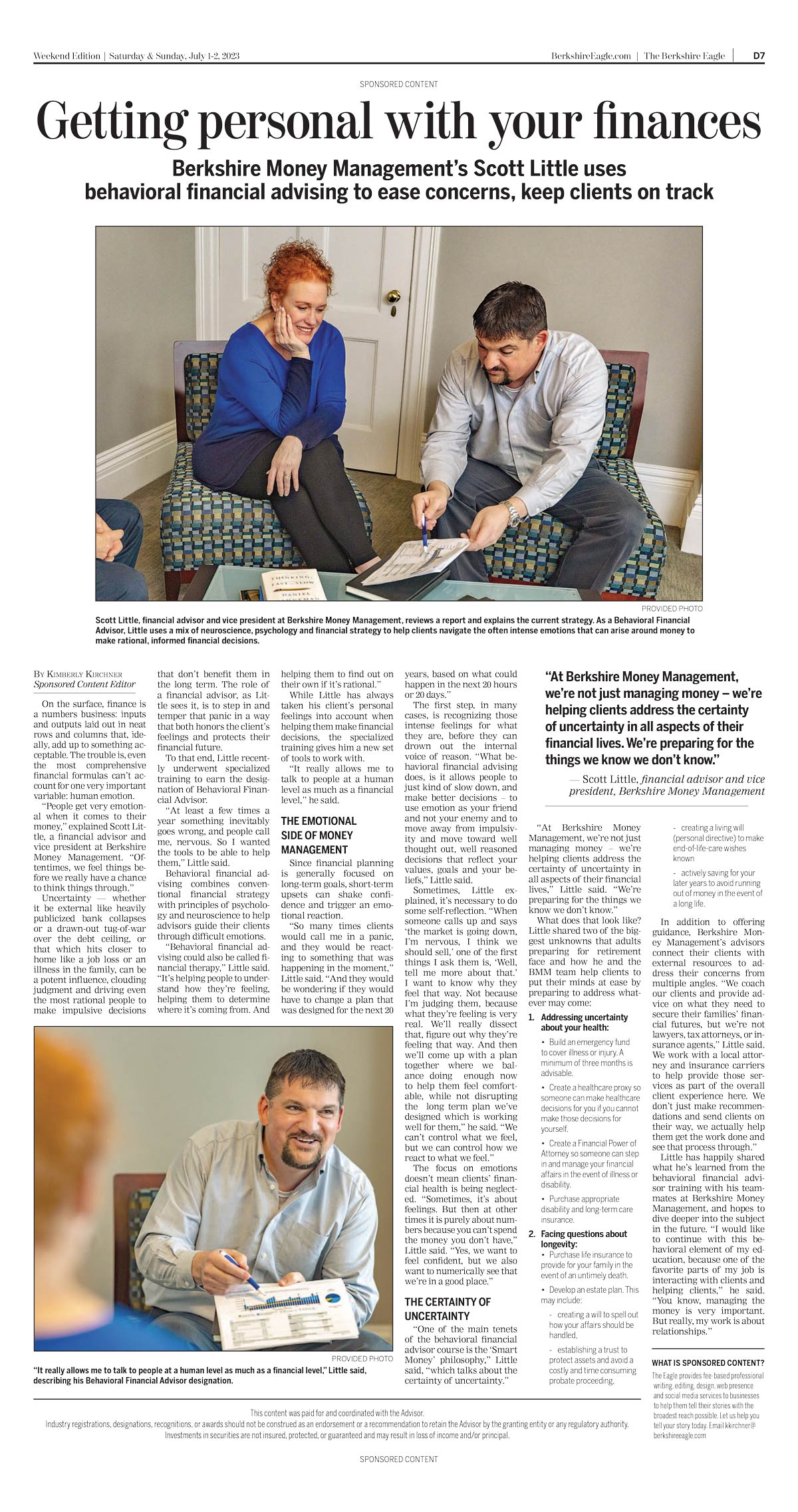Getting personal with your finances

By Kimberly Kirchner Sponsored Content Editor July 1, 2023
On the surface, finance is a numbers business: inputs and outputs laid out in neat rows and columns that, ideally, add up to something acceptable. The trouble is, even the most comprehensive financial formulas can’t account for one very important variable: human emotion.
“People get very emotional when it comes to their money,” explained Scott Little, a financial advisor and vice president at Berkshire Money Management. “Oftentimes, we feel things before we really have a chance to think things through.”
Uncertainty — whether it be external like heavily publicized bank collapses or a drawn-out tug-of-war over the debt ceiling, or that which hits closer to home like a job loss or an illness in the family, can be a potent influence, clouding judgment and driving even the most rational people to make impulsive decisions that don’t benefit them in the long term. The role of a financial advisor, as Little sees it, is to step in and temper that panic in a way that both honors the client’s feelings and protects their financial future.
To that end, Little recently underwent specialized training to earn the designation of Behavioral Financial Advisor.
“At least a few times a year something inevitably goes wrong, and people call me, nervous. So I wanted the tools to be able to help them,” Little said.
Behavioral financial advising combines conventional financial strategy with principles of psychology and neuroscience to help advisors guide their clients through difficult emotions.
“Behavioral financial advising could also be called financial therapy,” Little said. “It’s helping people to understand how they’re feeling, helping them to determine where it’s coming from. And helping them to find out on their own if it’s rational.”
While Little has always taken his client’s personal feelings into account when helping them make financial decisions, the specialized training gives him a new set of tools to work with.
“It really allows me to talk to people at a human level as much as a financial level,” he said.
The emotional side of money management
Since financial planning is generally focused on long-term goals, short-term upsets can shake confidence and trigger an emotional reaction.
“So many times clients would call me in a panic, and they would be reacting to something that was happening in the moment,” Little said. “And they would be wondering if they would have to change a plan that was designed for the next 20 years, based on what could happen in the next 20 hours or 20 days.”
The first step, in many cases, is recognizing those intense feelings for what they are, before they can drown out the internal voice of reason. “What behavioral financial advising does, is it allows people to just kind of slow down, and make better decisions – to use emotion as your friend and not your enemy and to move away from impulsivity and move toward well thought out, well reasoned decisions that reflect your values, goals and your beliefs,” Little said.
Sometimes, Little explained, it’s necessary to do some self-reflection. “When someone calls up and says ‘the market is going down, I’m nervous, I think we should sell,’ one of the first things I ask them is, ‘Well, tell me more about that.’ I want to know why they feel that way. Not because I’m judging them, because what they’re feeling is very real. We’ll really dissect that, figure out why they’re feeling that way. And then we’ll come up with a plan together where we balance doing enough now to help them feel comfortable, while not disrupting the long term plan we’ve designed which is working well for them,” he said. “We can’t control what we feel, but we can control how we react to what we feel.”
The focus on emotions doesn’t mean clients’ financial health is being neglected. “Sometimes, it’s about feelings. But then at other times it is purely about numbers because you can’t spend the money you don’t have,” Little said. “Yes, we want to feel confident, but we also want to numerically see that we’re in a good place.”
The certainty of uncertainty
“One of the main tenets of the behavioral financial advisor course is the ‘Smart Money’ philosophy,” Little said, “which talks about the certainty of uncertainty.”
“At Berkshire Money Management, we’re not just managing money – we’re helping clients address the certainty of uncertainty in all aspects of their financial lives,” Little said. “We’re preparing for the things we know we don’t know.”
What does that look like? Little shared two of the biggest unknowns that adults preparing for retirement face and how he and the BMM team help clients to put their minds at ease by preparing to address whatever may come:
- Addressing uncertainty about your health:
- Build an emergency fund to cover illness or injury. A minimum of three months is advisable.
- Create a healthcare proxy so someone can make healthcare decisions for you if you cannot make those decisions for yourself.
- Create a Financial Power of Attorney so someone can step in and manage your financial affairs in the event of illness or disability.
- Purchase appropriate disability and long-term care insurance.
- Facing questions about longevity:
- Purchase life insurance to provide for your family in the event of an untimely death.
- Develop an estate plan. This may include:
- creating a will to spell out how your affairs should be handled,
- establishing a trust to protect assets and avoid a costly and time consuming probate proceeding,
- creating a living will (personal directive) to make end-of-life-care wishes known
- actively saving for your later years to avoid running out of money in the event of a long life.
In addition to offering guidance, Berkshire Money Management’s advisors connect their clients with external resources to address their concerns from multiple angles. “We coach our clients and provide advice on what they need to secure their families’ financial futures, but we’re not lawyers, tax attorneys, or insurance agents,” Little said. We work with a local attorney and insurance carriers to help provide those services as part of the overall client experience here. We don’t just make recommendations and send clients on their way, we actually help them get the work done and see that process through.”
Little has happily shared what he’s learned from the behavioral financial advisor training with his teammates at Berkshire Money Management, and hopes to dive deeper into the subject in the future. “I would like to continue with this behavioral element of my education, because one of the favorite parts of my job is interacting with clients and helping clients,” he said. “You know, managing the money is very important. But really, my work is about relationships.”
This content was paid for and coordinated with the Advisor.
Industry registrations, designations, recognitions, or awards should not be construed as an endorsement or a recommendation to retain the Advisor by the granting entity or any regulatory authority.
Investments in securities are not insured, protected, or guaranteed and may result in loss of income and/or principal.



